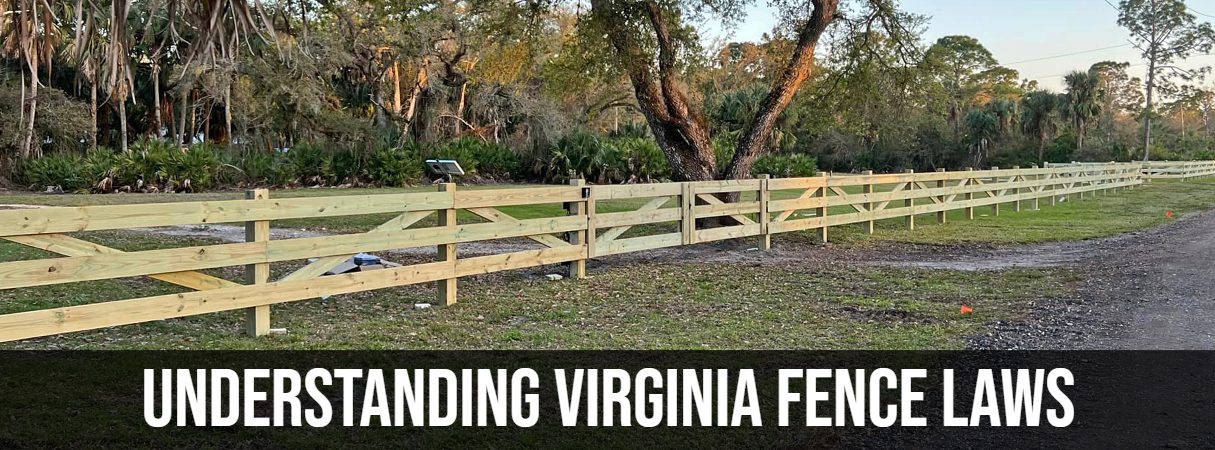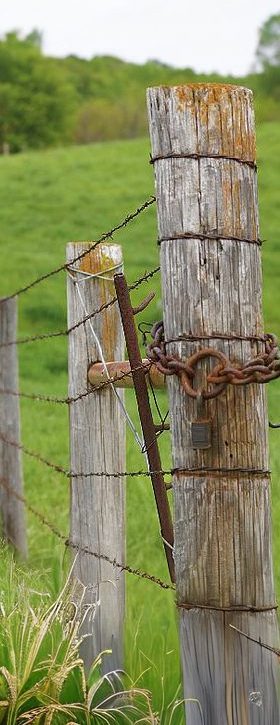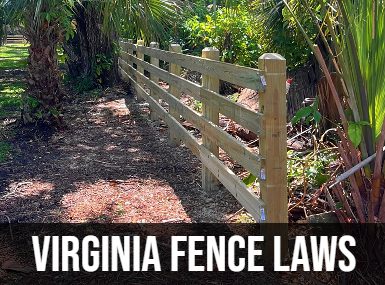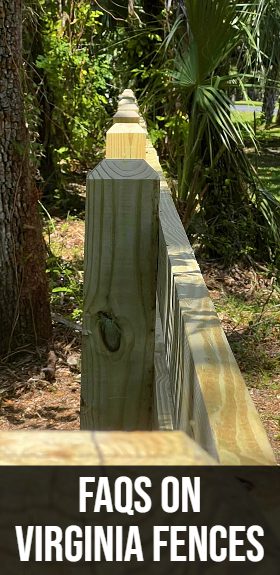
Overview of Virginia Fence Laws
So, you’re thinking about building a fence? Whether it’s to keep the neighbor’s curious dog out of your garden or to add a little privacy to your yard, there are a few things you’ll want to know before grabbing those fence posts. Virginia has its own set of rules and regulations when it comes to fencing, and trust me, you don’t want to be the neighbor who unknowingly violates local law by building a ten-foot monstrosity. Let’s dive into the nitty-gritty of Virginia fence laws so you can build without the drama.

Virginia Fence Laws: Key Rules You Need to Know
Fences might seem straightforward—just a few wooden posts and panels, right? Not quite. Virginia has some very specific rules that govern what you can build, how tall it can be, and even who foots the bill for repairs. These regulations vary by county and city, so it’s crucial to know what applies in your area. Whether you’re maintaining a family property, planning improvements, or preparing to sell inherited Virginia land, understanding these laws can save you from legal headaches (and angry neighbors) down the road, keeping both your property and your peace of mind intact.
Who Owns the Fence? Understanding Property Lines
What Defines a Boundary Fence in Virginia?
In Virginia, a boundary fence is, quite simply, any fence that is built on the property line between two neighbors. The key here is on the line, not near it or over it. If your fence sits directly on that magical line, it’s considered a shared fence—meaning both you and your neighbor have a say in what happens to it.
What If the Fence Is on the Neighbor’s Property?
Here’s where things can get tricky. If you accidentally build your fence on your neighbor’s property, prepare for some awkward conversations. Virginia law is pretty clear: you can’t just waltz over and stake your claim to someone else’s land. If the fence encroaches on their property, they’re well within their rights to ask you to move it. That’s why getting a survey before you build is a smart move.
Virginia Fence Height Restrictions: How Tall Is Too Tall?
You can’t just build a towering fortress and call it a day—Virginia has height restrictions on fences, depending on where you live and what part of your property the fence is going on. In most areas of Virginia, you’re looking at a maximum fence height of about four feet for front yards and six feet for backyards. If you’re thinking about going taller, you might need a permit, and if your neighbor’s giving you side-eye over a six-foot fence, you might want to check local rules to keep the peace.
Do You Need a Permit to Build a Fence in Virginia?
When Is a Permit Required?
The million-dollar question: do you need a permit to build your dream fence? The answer is, maybe. In most cases, fences under six feet in height don’t require a permit, but anything taller? Well, that’s going to involve a little paperwork.
How to Obtain a Fence Permit
If you find yourself in permit territory, don’t worry—it’s not as bad as it sounds. Typically, you’ll need to submit a plan to your local zoning office, showing where the fence will go and how tall it will be. From there, it’s just a matter of waiting for approval. Or, as we call it, the patience test. If you’re lacking patience, it might be worth asking yourself, what are the Pros & Cons of selling my Virginia land?

Fence Maintenance and Repairs: Who’s Responsible?
Shared Fences Between Neighbors
Who’s paying for that fence repair? If it’s a shared fence (remember that property line?), both neighbors are typically responsible for its upkeep. Virginia law says you split the cost. Now, whether you and your neighbor agree on what “upkeep” means—well, that’s a different story.
Virginia’s ‘Right Hand Rule’ for Fence Maintenance
Here’s a fun little nugget: the “right-hand rule.” It’s not a law, but in many parts of Virginia, folks have an unspoken agreement where each person maintains the right side of the fence from their perspective. If you’re lucky, your neighbor already knows this trick, and you’ll never have to debate who’s responsible for that rickety post.
Virginia’s Fence-in vs. Fence-out Rule
What Is the Fence-in Rule?
Virginia follows the “fence-in” rule when it comes to livestock. If you own animals, it’s your job to fence them in. Yep, that means you can’t just let your cows or goats wander around town without a fence. Seems fair, right?
What Is the Fence-out Rule?
Some states have a “fence-out” rule, which means the burden is on you to keep other people’s animals off your property. Not Virginia though—you’re responsible for keeping your own animals contained. So, if you’ve got a couple of sheep who like to escape, it’s time to reinforce that fence.
Dealing with Fence Disputes in Virginia
How to Handle a Neighbor’s Disagreement Over a Fence
Fences make good neighbors… until they don’t. If your neighbor isn’t thrilled about your new fence, start by having a friendly chat. Often, a little communication can go a long way. If things escalate, you can look into mediation services offered by your local government before anyone pulls out the legal card.
Mediation and Legal Options for Virginia Fence Disputes
If a simple conversation won’t cut it, mediation is a solid option. It’s a way to resolve the issue without going to court. However, if your neighbor remains unmovable (pun intended), you might have to seek legal counsel. Just remember—fighting over fences rarely ends in a win for either side.
Specific County & City Fence Laws in Virginia
Northern Virginia Fence Laws
Different regions in Virginia may have slightly different rules. In Northern Virginia—think Fairfax, Arlington, Alexandria—you might encounter stricter regulations, especially when it comes to height and materials. Be sure to check with your local zoning office before starting your fence project.
Rural Fence Laws in Virginia
Rural areas of Virginia are a bit more relaxed. You’ll find more leniency in fence height and livestock-related regulations. But don’t assume anything—rural counties still have rules, especially concerning boundary fences and agricultural land.
Conclusion to Navigating Virginia’s Fence Laws
Navigating Virginia’s fence laws may seem like a lot of red tape, but with a little research and preparation, you can avoid most of the common pitfalls. Whether you’re looking to add a privacy fence, spruce up your yard, or keep the family pet from wandering into the neighbor’s garden, following the rules will keep things smooth and neighborly. By understanding everything from height restrictions to shared fence responsibilities, you’ll protect yourself from costly disputes and ensure your fence stands the test of time—without becoming the talk of the neighborhood (for all the wrong reasons). Now, go ahead and plan that perfect fence, but maybe double-check those property lines first! At some point, it might be worth asking…. How do I sell Virginia land without a Realtor?
Frequently Asked Questions (FAQs)

1. What Is the Maximum Fence Height Allowed in Virginia?
The maximum height for fences in Virginia is generally 6 feet for backyard fences and 4 feet for front yard fences, though local ordinances may vary by city or county.
2. Do I Need a Permit to Build a Fence in Virginia?
You may need a permit if your fence exceeds a certain height, typically 6 feet, or if it involves specific materials or locations, such as historic districts. Always check with your local zoning office.
3. Who Is Responsible for Maintaining a Shared Fence?
In Virginia, the responsibility for maintaining a shared fence (one that sits on a property line) is typically divided between both property owners. Costs and repairs should be shared equally unless otherwise agreed.
4. Can I Build a Fence Directly on the Property Line?
Yes, but you will need your neighbor’s agreement before building a fence directly on the property line. Otherwise, the fence should be built within your property boundaries.
5. How Can I Resolve a Fence Dispute with My Neighbor?
Start by discussing the issue directly with your neighbor. If that doesn’t resolve the problem, you can seek mediation or, as a last resort, take legal action to settle the dispute.